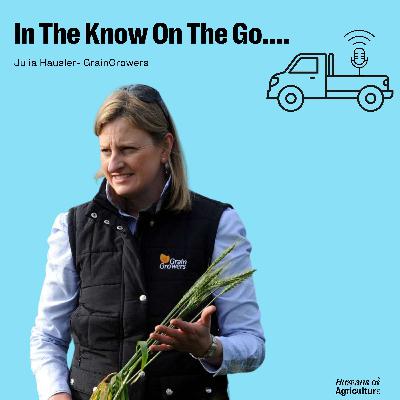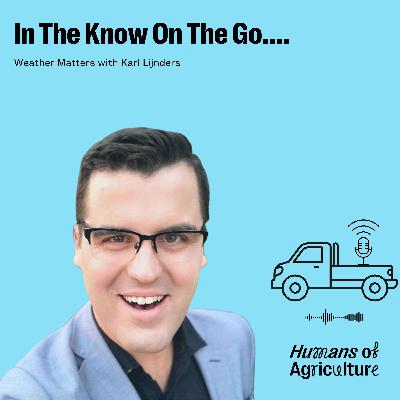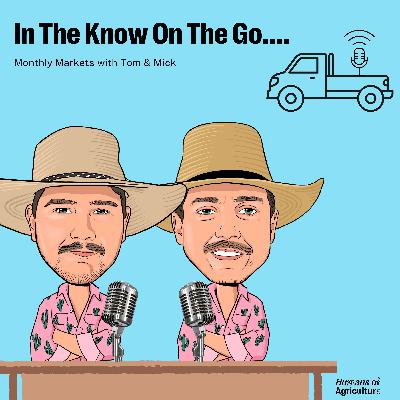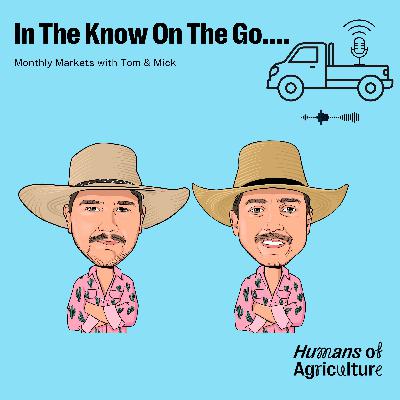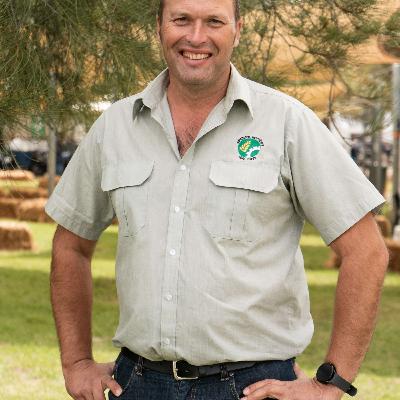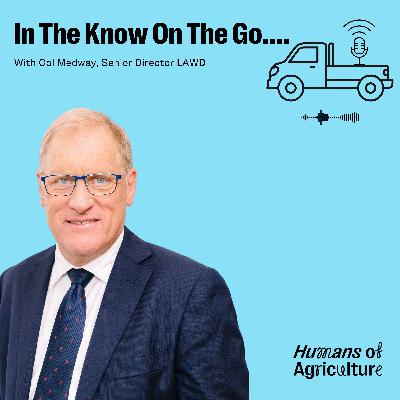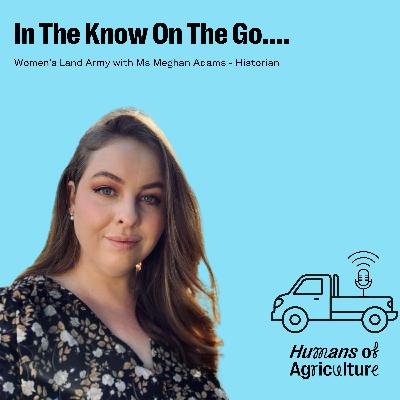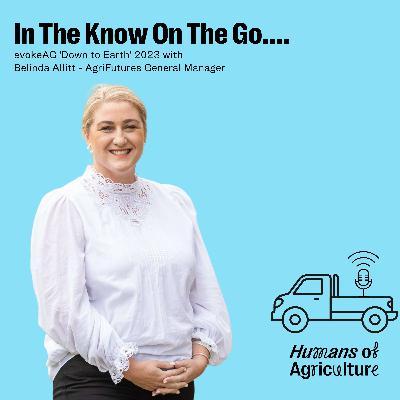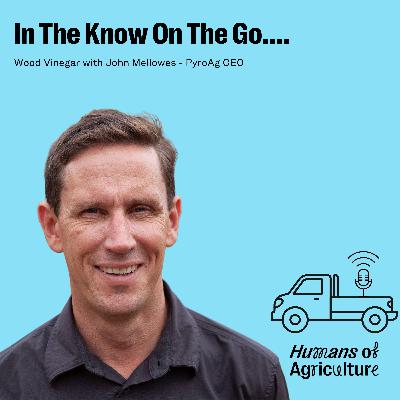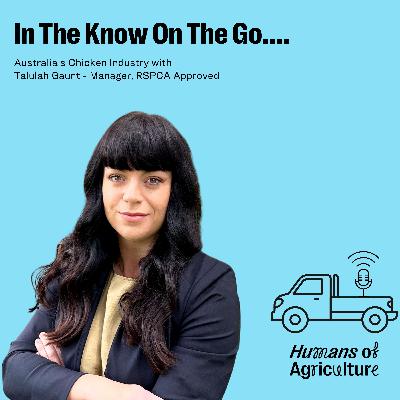Discover The Aussie Ag Update
The Aussie Ag Update

The Aussie Ag Update
Author: HOA Media
Subscribed: 2Played: 21Subscribe
Share
© 2025 HOA Media
Description
Sick of sifting through the paper? Waiting around only to miss the headlines play through the wireless?
The Aussie Ag Update is designed to get you up to speed on the things that matter in Aussie Agribusiness. Bringing together the right people to get your questions answered!
The Aussie Ag Update is designed to get you up to speed on the things that matter in Aussie Agribusiness. Bringing together the right people to get your questions answered!
28 Episodes
Reverse
In the fourth and final episode of Carbon Shortcuts: An introduction to all things Carbon in Aussie Agriculture, hosts Oli Le Lievre and Sam Noon pick Professor Richard Eckard’s brain one last time about all things carbon in agriculture.It has been a learning journey for all the challenges and opportunities in addressing carbon emissions within agriculture. The carbon series may be concluding, but it serves as a starting point for ongoing conversations and deeper exploration of carbon-related issues (and opportunities) in agriculture. This final episode wraps up with a focus on the following: The ‘transition zone’ Exploring tools and opportunities for farmersHurdles in adoption and implementation Due diligence in toxicologyThe biggest lessons so far from Australia's carbon journeySeries sponsorThis series is sponsored by Ruminati, an online emissions calculator created by farmers for farmers. You can learn more about their solution here, show notes or by listening to all episodes in the 4 part series, plus a bonus episode with Ruminati founder, Bobby Miller. Disclaimer: The information shared as part of this carbon series is general in nature. We're asking questions of Professor Richard Eckard. And he's providing his insights from his expertise. Humans of Agriculture doesn't endorse any of his views as part of this. They're really designed to just be conversation starters. And if you want to get more information, please reach out to specialists and experts in the carbon space.
In this BONUS episode of Carbon Shortcuts: An introduction to all things Carbon in Aussie Agriculture, host Oli Le Lievre is joined by Bobby Miller, farmer and co-founder of Ruminati. Ruminati is an online emissions calculator helping producers across Australia track and validate on-farm climate action across the supply chain."Farmers are at the forefront of climate change and have a critical role to play in reducing emissions and building a sustainable future." - Bobby MillerJoin us as we explore the origins of Ruminati, how it works, the challenges faced by farmers, and the future potential in this space.Series sponsorThis series is sponsored by Ruminati, an online emissions calculator created by farmers for farmers. You can learn more about their solution here, show notes or by listening to episodes 1-4 in the series. Disclaimer: The information shared as part of this carbon series is general in nature. We're asking questions of Bobby Miller and he's providing his insights from his experience in developing Ruminati. Humans of Agriculture doesn't endorse any of his views as part of this. They're really designed to just be conversation starters. And if you want to get more information, please reach out to specialists and experts in the carbon space.
Welcome to episode 3 of “Carbon Shortcuts: An introduction to all things Carbon in Aussie Agriculture”, where hosts Oli Le Lievre and Sam Noon uncover more key learnings shared by Professor Richard Eckard, the expert in carbon. The discussion revolves around the opportunities for farmers on their land and sheds light on unexplored areas of the agricultural supply chain. They also answer audience questions and discuss the industry's progress in reducing its carbon footprint.Agricultural supply chain carbon targets and reduction actions The differing roles between the private and government sectorsThe different classes and variations of emissions Greenhouse gas accounting frameworks How farmers can begin to get involved in carbon projects/markets This series is sponsored by Ruminati, an online emissions calculator created by farmers for farmers. You can learn more about their solution in the show notes or by listening to episodes 1 and 2 in the 4 part series. Disclaimer: The information shared as part of this carbon series is general in nature. We're asking questions of Professor Richard Eckard. And he's providing his insights from his expertise. Humans of Agriculture doesn't endorse any of his views as part of this. They're really designed to just be conversation starters. And if you want to get more information, please reach out to specialists and experts in the carbon space.
In this episode of, Carbon Shortcuts: An introduction to all things Carbon in Aussie Agriculture, hosts Oli Le Lievre and Sam Noon are joined by Professor Richard Eckard from the University of Melbourne. The discussion revolves around the different types of carbon markets, the distinction between offsetting and insetting, and the emergence of biodiversity credits. The difference between the Voluntary and Compliance MarketsThe different Participants and Trades in each marketThe revenue potential and investment required to be involved in carbon projectsand Shifting focus from Carbon to the emergence of Biodiversity and understanding the emerging opportunityThis series is sponsored by Ruminati, an online emissions calculator created by farmers for farmers. You can learn more about their solution here show notes or by listening to our bonus episodes after episodes 3 and 4.Disclaimer: The information shared as part of this carbon series is general in nature. We're asking questions of Professor Richard Eckard. And he's providing his insights from his expertise. Humans of Agriculture doesn't endorse any of his views as part of this. They're really designed to just be conversation starters. And if you want to get more information, please reach out to specialists and experts in the carbon space.
In this episode, Oli Le Lievre and Samantha Noon embark on a journey to explore the carbon space in Australian agriculture. They are joined by Professor Richard Eckard, a renowned expert in climate and agriculture, to shed light on key concepts like carbon neutrality and net zero. The conversation covers Australia's emission reduction goals, the choice of baseline years, and the differences between net zero and carbon neutral. Across this series we aim to demystify the carbon space and shed light on the challenges and opportunities it presents.Key areas covered:Understanding Australia's emission reduction targets & how they have been setBaseline years and carbon neutralityCarbon Neutral vs Net Zero vs Climate NeutralVarious other environmental claimsThe challenge & opportunity for carbon neutrality in AgricultureThis series is sponsored by Ruminati, an online emissions calculator created by farmers for farmers. You can learn more about their solution here show notes or by listening to our bonus episodes after episodes 3 and 4.Disclaimer: The information shared as part of this carbon series is general in nature. We're asking questions of Professor Richard Eckard. And he's providing his insights from his expertise. Humans of Agriculture doesn't endorse any of his views as part of this. They're really designed to just be conversation starters. And if you want to get more information, please reach out to specialists and experts in the carbon space.
Welcome to the Quick Preview of Humans of Agriculture's Carbon Shortcuts.In this episode, hosts Oli Le Lievre and Sam Noon, chat about what has got them curious about the Carbon space. With the global focus and interest in Carbon and Carbon emissions it's certainly an area getting lots of attention, investment, science and interest.💡 The series is designed to raise awareness and be a conversation starter rather than providing specific advice.👨🏫 Professor Richard Eckard from the University of Melbourne is interviewed as an industry leader to discuss the complexities of the carbon market and its impact and opportunities on the agricultural landscape.🤔 Sam mentions an interesting takeaway from the series for her is the discussion of the Methane Free Animal 🏬 They mention the importance of supply chain targets and the movement towards net-zero by 2050, with significant developments expected from 2030 onward.💡 So strap in for this series which consists of four episodes, and the hosts plan to continue discussing carbon-related topics regularly.🤝 This series is sponsored by Ruminati, an online emissions calculator for farmers. Disclaimer: the information shared across this series in general nature. The interviewee Professor Richard Eckard's views are not endorsed by Humans of Agriculture. If you are looking to find out more information in this space, please consult an advisor. Cya for Episode 1!
In this episode of the "In The Know On the Go" podcast, host Oli Le Lievre is joined by Julia Hausler, Director at GrainGrowers, to discuss their recent trip to Vietnam and the opportunities for Australian grain growers in the Vietnamese market. Julia shares insights from their visit, including interactions with customers, suppliers, and policymakers, as well as their participation in the Australian grains industry conference. They delve into the growing demand for grains in Vietnam, the importance of sustainability and profitability, and the need for market education and supply chain improvements to remain competitive. Julia highlights the significance of consistency in grain quality and the role of falling numbers in meeting customer expectations.Episode Highlights:Julia's role as a grower director at GrainGrowers and her focus on sustainability and profitability: "And you can throw sustainability, which is a good new focus for us, profitability and sustainability into that mix. And just generally thinking of putting the grower first for everything that we do."Purpose of the trip to Vietnam and engaging with the market: "As growers, we don't always get that opportunity to meet the customers or the processors or the consumers as well in foreign markets because we're that one step removed from the supply chain."Rapid growth and opportunities in Vietnam: "Well, it seems to be in rapid growth actually... There was enormous amount of construction going on. There was a large population moving around, and Vietnam has 90 million people."Vietnamese demand for Australian grains and increasing middle-class population: "That's a big opportunity for changing consumer habits... demand for baked goods, which is good news for wheat, but also good demand increase for animal protein."Importance of grain quality and consistency: "Time and time again, the customers said they like Australian rice, wheat, and barley because it's clean, it's dry, it's white, it's sound, with a high falling number, and it's food safe."Recommendations for growers to stay competitive and informed: "They can also contact GrainGrowers, talk to any of us on our delegation who went on the delegation as well. And, yeah, and the trade as well. It's really important that the trade and growers have a good working relationship to understand what growers deliver makes what the trade needs."subscribe to stay across the latest news and insights from across Aussie Agriculture.
In this episode, host Oli Le Lievre chats with Karl Lijnders and gets the latest updates on weather conditions across Australia and what the implications might be for farmers and crop production.What’s discussed:Rainfall Patterns: Karl provides an overview of rainfall conditions across different regions. Who’s getting the rain and who needs it.El Nino: The Indian Ocean Dipole has shifted, resulting in cooler sea surface temperatures and less moisture, while the Pacific Ocean is cooling down on the eastern side of Australia. (Again, Karl predicts a drier and hotter second half of the year)Tasmania and Fire Dangers: Seeing significant dry bias in northern and eastern Tasmania as summer approaches with concerns about potential fire dangers in southeastern Australia (including Tassie), due to the dry conditions.Snow Season Predictions: How the recent snowfall at Thredbo does not determine the entire season (in fact the snow season may be lean due to the influence of El Nino and expectations of a warmer and drier year.)
Tom (T-Truck) and Mick (Corkscrew) are back on with their fourth episode of the Monthly Markets with Tom and Mick, they’re joined by special guest Todd Cranney (aka TC/Mr Wagyu) to talk beef.They cover TC's Wagyu business (and his bakery order), the beef market, feedlots and Angus cattle.Strap yourselves in!
Well with these two you know what you're going to get, some generous humour, average jokes, banter, and the latest information on the markets. This week Tom & Mick sit down with James Tierney from Riverina Livestock Agents to chat mainly sheep things, as well as Tom's remarkable selling record.
The National Farmers Federation recently released a report looking at the state of mental health amongst Australian Farmers.
Welcome back to the In The Know On the Go Podcast.This week, host Oli Le Lievre sits down with Col Medway, Senior Director at LAWD, to get across the latest trends and happening in the Aussie Rural Real Estate market.We cover:The outlook for 2023 and where the capital is coming fromThe changes in the past 6 months to the rural property marketAdvantages for international institutional investors with current exchange ratesImportance for land stewardship and ownership in the property marketThe Global Agricultural investing conference in New York from April 3-5
In this episode of the "In the Know on the Go" podcast, Host Oli Le Lievre is joined by John Droppert from Dairy Australia talks about the Australian dairy industry. We cover:The conversation moves to the trends in the Australian dairy industry over the last 12 months. The latest report released by Dairy Australia shows a decrease of about 4-6% in total milk supply. John says this is a longer-term trend than just one season. Milk production peaked in 2012, and since then, there have been several factors that have contributed to the decline. These include milk price step-downs, farmers retiring or moving into beef, and labor shortages due to Covid.John talks about shifting consumer trends, with more people opting for full-fat milk over low-fat. Key statistics discussed in the episode include the decrease in total milk supply by 4-6% and the peak in milk production in 2012 at 11.2 billion litres. Did you know South Australians LOVE their flavoured milk, drinking three times the national average!
We've been harbouring a curiosity for the Women's Land Army ever since Fanny Lumsden mentioned them in her Humans of Agriculture episode: From Country Halls to Nashville - The Fanny Lumsden Story - and we've finally found the expert that can give us the lowdown.Ms Meghan Adams, historian at the Australian War Memorial, joins us to get all our questions answered about the women who stepped into agricultural roles they probably never expected themselves to be in during World War 2. Meg is passionate about getting the stories of these women out there, and we feel really grateful that we can bring this piece of history to you!In this episode, Meg tells us all about:How she became a historianWhat was the Women's Land Army? When was it formed and why?Australia's role as a food provider for allied nations and the women who kept the agriculture industry ticking over How many women were Land Army "Girls"?Where were these women recruited from?What kind of jobs were they doing out on the farms?Why was there scepticism and how did they overcome it?The breaking down of stereotypes and barriers that lead to further employment of women post-1945To read more head to Australian War Memorial - Women's Land Army
This week we welcome back Tom Rookyard and Mick Corcoran for their second instalment of the Monthly Markets with Tom & Mick. The fellas sit down with Joel Fleming, Director at Nutrien Harcourts and Livestock and Equine agent, to understand the trends in performance horse sales over the last couple of years and into the future.They cover:Affects of rainfall on the sector and oat plantingNutrien Classic Sale - read more here: Nutrien Classic Sale Report Purchases of performance horses as not just a lifestyle but a professionWhat is driving the horse market year to year?The growth of performance horse sales per person - from owning one to owning severalJoel's predictions of where the EYCI number will be by Christmas
On the 21st to 22nd of February we were at evokeAG 'Down to Earth' 2023 in Adelaide, the traditional lands of the Kaurna people. It was a wonderful two day event and we wanted to bring a piece of it to you!At the conference, we got the chance to sit down with Belinda Allitt, the General Manager of Communications & Capacity Building, at Agrifutures Australia. She's been working with AgriFutures for over six years and we wanted to hear all about the work that went into bringing this conference together, what they were hoping to achieve, and what's coming up for them next.Belinda answers these questions in the weeks ep:How was she feeling at the end of day two of evokeAG 2023?After three years of conference cancellations, how have the team stayed motivated?Why does evokeAG exist?What are evokeAG going to do between now and the next conference to gain momentum?Where do they find their Future Young Leaders?What can she tell us about evokeAG 2024?Check out these links for more info:https://evokeag.com/https://agrifutures.com.au/
Meet Richard Mussell.He is the CEO of RSPCA Australia and has been since January 2020.The RSPCA is known for being committed to improving the welfare of millions of animals across Australia. The RSPCA has been operating for over 150 years, and RSPCA Approved has been part of the organisation for 25 years now. There’s a lot to learn when it comes to how the RSPCA implements higher animal welfare standards, and we’re hoping we can ask some of the questions you want answered. We sat down with Rich to understand more about how the organisation operates. In this chat Richard talks to:What is the RSPCA?Animal Welfare policy in agricultureHow does the RSPCA affect change in the animal welfare space?Education resources provided by the RSPCAHow is the RSPCA funded?RSPCA wanting to see improvements across companion, farm and wild animalsHow can the broader community see the work of RSPCA?The collaborative process between RSPCA and producers for RSPCA ApprovedHas there been a shift in the publics interest in animal welfare?Why does Richard work at the RSPCA?https://www.rspca.org.au/
John Mellowes saw an opportunity with wood vinegar, little did he know it would change the course of his life's work.A civil engineer by trade, he and his business partner, Chad, began their journey with PyroAg about eight years ago and throughout that time they have discovered the many uses that pyrolyzed (don't worry, we'll explain that in the episode) wood chips can have.Whether you've heard of wood vinegar or not, it's definitely one to get across and hopefully you come away from this ep with some answers but also lots of curiosity! John answers these questions in the episode:What is John's background and how does it intertwine with agriculture?What is PyroAg?How do you take a waste product and turn it into a high value good of a different kind?Is one byproduct of the pyrolysis process better or are all the byproducts beneficial?If you had 10 tonnes of input (wood/green waste), what does that look like in terms of output?What kind of volumes are going through the process at the moment and where do you source the input from?How much does wood vinegar cost?How much wood vinegar do farmers buy?How is wood vinegar applied?How are you making sure the product is safe for use on crops?What are the benefits to the soil and what are you learning about microbial activity?Where do you see PyroAg in 10 years?It looks like a lot... but trust us, it's all in this 15 minute ep so let's get into it!https://www.pyroag.com/
Meet Dwain Duxon, Founder and CEO of Farm Tender.Dwain saw a gap in the market - literally - and launched an online marketplace for the buying and selling of "everything to do with agriculture."Farm Tender markets to over 60,000 members on their website: https://www.farmtender.com.au/ and in this episode Dwain tells us all about what it's been for him to get off the tools and onto selling them.Dwain answers these questions:What is Farm Tender?Why did Dwain start Farm Tender in 2012?What have been the highlights in the business over the past decade?Why didn't Farm Tender take in the US?Did his stint in the US make Dwain more passionate about Australian ag?How do you build relationships while working remotely?What's next for Farm Tender?What is Delay Pay, how can it benefit farmers and is there an upper limit on borrowing?The who, what, when, where, why for The Business of Farming: Farm Tender 2023 Conferencehttps://www.farmtender.com.au/
*Spoiler Alert* Did you know that no meat chickens in Australia are grown using hormones?Well, Talulah Gaunt - Manager of RSPCA Approved - did, and she knows a whole lot more too. This weeks episode is a follow up to our This Is Aussie Ag: Higher Animal Welfare in Meat Chickens video, and we ask Talulah all the questions that came off the back of watching the vid. You might have heard her own story on Humans of Agriculture, but today she's here to flex her animal welfare knowledge muscle, and we can't wait for you to learn along with us.Questions answered by Talulah:Are hormones used anywhere in chicken production?How much of the chicken industry is farmed under high welfare standards, RSPCA or otherwise?What is the difference between RSPCA approved versus general production?How do random assessments of RSPCA approved farms work?If a farm is RSPCA approved, do they have to follow the standards all the way through the life of the animal?Why do some chickens have missing feathers?Are antibiotics and other medicines used on chickens?Why do some birds sit with their legs outstretched?Wow we sure do cover a lot in not even 14 minutes!If you would like to learn more, visit https://rspcaapproved.org.au/


